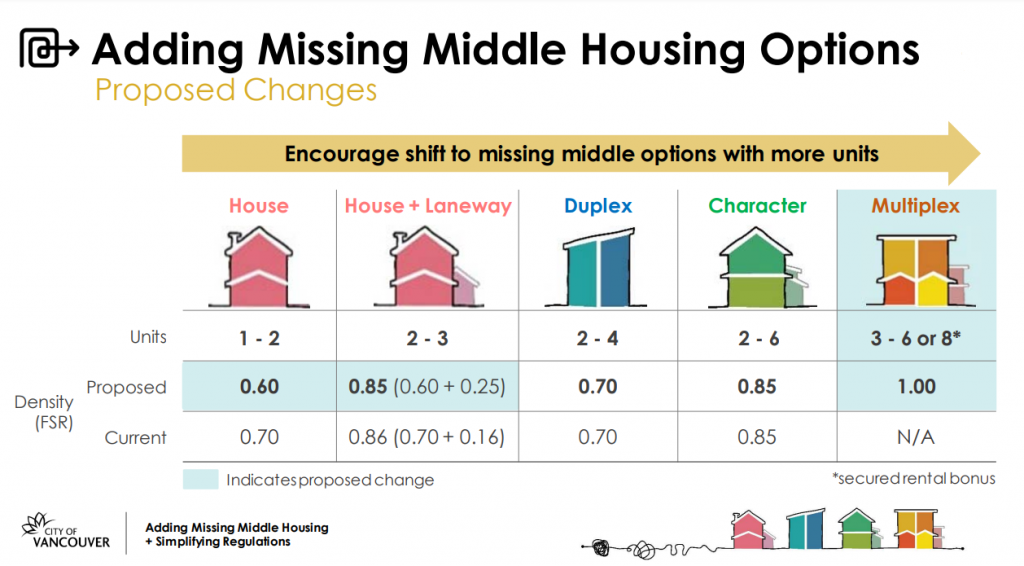Last Thursday, after a lengthy eight-hour public hearing, the Vancouver Council unanimously passed a motion for lower-density neighbourhoods to allow up to eight homes on a single lot.
The new zoning changes allow for multiplex homes as an option for new builds along with an amendment to allow for character homes to add units to the existing dwelling.
This motion also carries a reduction in the size of single-detached homes but increases the size of new laneway houses in an effort to encourage the adoption of the multiplex.
Standard-size lots can now carry up to four units with larger lots able to hold up to eight.
With respect to zoning changes, the motion consolidates nine low-density residential zones into a single new residential inclusive zone with the goal of simplifying regulations.

Overall, HAVAN supports this initiative and believes for the most part, the City is moving in the right direction in its plans and policies to streamline the RS zones, advance missing middle opportunities, infill, and laneway housing, and support “gentle densification. If affected in a manner that is supportive this program could be an additional measure to help address the housing supply crisis, we are all trying to mitigate.
While we are strongly supportive of the concept, we see the proposed regulation embodies some inherent challenges that we believe may become barriers to delivery of multiplexes, and ADUs. City staff have indicated that they anticipate receiving roughly 150 – 200 multiplex applications per annum after addressing the built-up backlog of pending applications – the framework to process said applications needs to be oriented to delivering as many homes as possible.
As the 13th presenter of 60+ people speaking at the hearing, each with an allotted 5-minutes ‘at the podium’, points of concern highlighted include:
1. Ensuring maximum opportunity and flexibility regarding density allocation and FSR. Our members have made it clear to HAVAN that the maximum single-family home should remain at 0.7 FSR and not be reduced to 0.6 FSR. Reducing the maximum FSR may yield single homes that in the future when adapted to include suites, and or multigenerational living would see less flexibility. The difference of 0.1 represents approx. 400 sq. ft. on a typical 33’x125’lot – that’s equal to two bedrooms or a studio suite. The opportunity exists to generate additional homes, but without flexibility, the potential size of new units may not be practical to serve the changing needs of families.
While not specifying maximums for a primary house or laneway home, our analysis points to a minimum of 1.0 – 1.2 FSR to maximize flexibility, and opportunity to provide livable homes while still respecting the scale and character of a neighborhood. We appreciate that the proposed regulations allow for a density bonus of 0.30 FSR, to a total of 1.0 FSR across a property, but the criteria as they stand now may prove to be challenging to achieve and add enough cost with density bonusing charges that it could potentially become a disincentive to proceed.

Illustrations of streetscapes for multiplex debate and decision at Vancouver City Hall on Friday, Sept. 14, 2023. PHOTO BY CITY OF VANCOUVER /jpg
2. Stratification. We strongly believe that providing increased density, with maximum opportunity and flexibility for property owners, in an environment that incents rather than restricts will help achieve a positive and robust program that can make a meaningful difference in increasing housing supply and choices. Tied into this is also the matter of tenure and we strongly support the concept of stratification and ownership models that are much more predictable to securing financing.
3. Hydro Upgrades. A third concern that we have heard from members as per the construction of secondary or tertiary homes on a single property is the burden of upgrading hydro infrastructure. In cases where electrical capacity needs to be increased, property owners will be forced to carry the cost burden of installing pad mount transformers (PMT) on private property to accommodate the additional units and these costs have been seen to be reaching well into six figures. PMTs require direct and generous access to ensure serviceability.
Demanding PMTs compromises lot area, affordability, and parking opportunities. Costs are not insignificant, and we believe if all RS lots can support multiple units those costs should be evenly distributed rather than allocated on a lot-by-lot basis and this infrastructure should be placed on public land in existing ROWs to accommodate additional and upgraded hydro infrastructure. A thorough and comprehensive load analysis should be undertaken to ensure that loads and infrastructure are appropriately matched, and the upgrades should be encompassed within BC Hydro capital extension works.
4. Alignment. Lastly, we wish to ensure close alignment of the CoV proposals with pending provincial multiplex programs to promote a broadly based uniform approach rather than a parallel program that will sow confusion, drive disparate requirements, and affect costs.
This initiative can be an effective program to add an additional means to cope with our housing demands. Maximizing flexibility, choice, potential yield, and ensuring costs can be kept within reasonable thresholds will be essential to the program’s success, and contrary to the situation seen in Victoria where the uptake has been zero, the focus should be on incentivizing participation versus being unduly restrictive. We look forward to open communication moving forward as we work with city staff to collaborate on solutions and decisions that will positively address the significant need for new homes in Vancouver.
OTHER NEWS ACROSS CANADA … ON THE HILL
The Federal Government Removes GST from New Rental Builds
CHBA CEO Kevin Lee appeared on CBC’s Power & Politics to discuss the federal government’s move to eliminate the GST on the construction of new rental apartments in an effort to make housing more affordable.
Commentary: The removal of the GST on purpose-built rental (PBR) is very welcome news for the Association. This comes after years of advocacy and a big push in recent months given current circumstances, and included strategic engagement with the Minister of Housing, Infrastructure and Communities Sean Fraser as well as Minister of Finance Chrystia Freeland’s office, deputy ministers, CMHC, and staff at Finance Canada and Infrastructure Canada, as well as CHBA’s pre-budget consultations submission. This was also a prominent ask in CHBA’s Day on the Hill advocacy event in May. With the elimination of GST on purpose-built rental at the federal level, it will now be very important that provincial governments follow suit with their own taxes on purpose-built rental. Also very critical is the need for municipalities to reduce their development taxes on not only purpose-built rental, but all housing (including for homeownership).
HAVAN continues to work with CHBA BC and CHBA to advocate for all levels of government to work together to address the challenges of the housing industry including zoning restrictions, density limits, and NIMBYism.
Looking to stay up-to-date on Metro Vancouver’s residential housing industry? Sign up for Ron’s weekly Monday Morning Briefing and other HAVAN emails here.
QUICK BITES
- STOREYS reports as much as 15% to 20% of the total cost for a rental project consists of fees that have to be paid before construction can even begin, and although the GST is still 5%, construction costs have gone up in recent years and the 5% is charged on the fair market value of the project, which factors in construction costs, meaning the amount developers have to pay has gone up.
- Prime Minister Justin Trudeau announced the “first of many” municipal agreements under the federal government’s Housing Accelerator Fund with London ON receiving $74-million to fast-track the creation of more than 2,000 housing units over the next three years.
- The Globe and Mail Editorial Board looks at who’s to blame for lack of housing. Federal? Provincial? Or your local Mayor, noting 49 years ago in 1974, Canada saw 257,243 homes built, a number that has never been eclipsed.
- Frances Bula reports in the Globe and Mail on the CoV’s sweeping changes asking are they enough?
- BCREA reports sales trend slightly lower in August.
- RBC’s Monthly Housing Market Update notes August marked the second-straight month home resales dipped (down 4.1% from July) and home price gains moderated. Earlier tight demand-supply conditions eased further as the number of homes put up for sale climbed again (albeit slightly). The majority of local markets have sharply rebalanced by now. We think the cooling trend will extend into the fall season despite the Bank of Canada pausing its rate hike campaign.
- Access BC Housing’s August New Homes Registry noting in the first eight months of 2023, 30,856 new homes were registered2 in B.C., including 4,763 single detached3 and 26,093 multi-unit homes4. So far in 2023, total home registrations are down 22.8% from 2022. Registrations for multi-unit homes decreased 21.6%, while registrations for single detached homes decreased 28.9%, with 12,471 purpose-built rental units registered in B.C. in 2023, an increase of 12.7% over 2022.
- CBC reports Vancouver councillors will increase the licence cost for short-term rentals in the City of Vancouver from $109 to $1,000 next year in an effort to ease property taxes).










